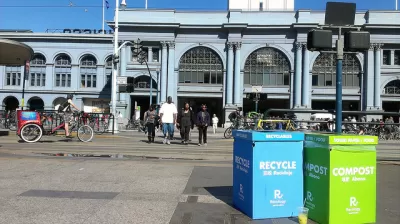In an effort to address climate change, San Francisco has a plan to get residents and businesses to do more than just recycle and compost.

Recycling and composting have long been a part of life in San Francisco. Now the city is leading the way with a no-waste initiative. It is asking other cities to join it in a commitment to decrease the amount of all waste and recyclables by 15 percent and the amount of material going to landfills by 50 percent by 2030.
To push beyond just recycling and composting, city leaders are coming up with ways to get more materials out of the waste stream. “Residents will have to voluntarily give up some of the stuff they buy, for example, and more pressure will have to be exerted on manufacturers to make things that don’t break down,” reports Kurtis Alexander.
San Francisco is hosting the Global Climate Action Summit, an event bringing together environmental activists and leaders from around the world, starting September 12. The Trump administration’s reversal of policies intended to curb climate change means more efforts are happening at the state and local levels:
Absent federal leadership, organizers of the San Francisco summit expect to roll out initiatives among cities, states and other subnational governments, as well as from businesses, with such climate goals as making buildings more energy efficient, increasing investment in environmentally friendly bonds and generating zero waste.
The city plans to promote its zero-waste initiative at the summit as a way to encourage other cities to reduce methane and energy use.
FULL STORY: S.F. invites world to join in zero-waste initiative

Alabama: Trump Terminates Settlements for Black Communities Harmed By Raw Sewage
Trump deemed the landmark civil rights agreement “illegal DEI and environmental justice policy.”

Study: Maui’s Plan to Convert Vacation Rentals to Long-Term Housing Could Cause Nearly $1 Billion Economic Loss
The plan would reduce visitor accommodation by 25% resulting in 1,900 jobs lost.

Why Should We Subsidize Public Transportation?
Many public transit agencies face financial stress due to rising costs, declining fare revenue, and declining subsidies. Transit advocates must provide a strong business case for increasing public transit funding.

Paris Bike Boom Leads to Steep Drop in Air Pollution
The French city’s air quality has improved dramatically in the past 20 years, coinciding with a growth in cycling.

Why Housing Costs More to Build in California Than in Texas
Hard costs like labor and materials combined with ‘soft’ costs such as permitting make building in the San Francisco Bay Area almost three times as costly as in Texas cities.

San Diego County Sees a Rise in Urban Coyotes
San Diego County experiences a rise in urban coyotes, as sightings become prevalent throughout its urban neighbourhoods and surrounding areas.
Urban Design for Planners 1: Software Tools
This six-course series explores essential urban design concepts using open source software and equips planners with the tools they need to participate fully in the urban design process.
Planning for Universal Design
Learn the tools for implementing Universal Design in planning regulations.
Smith Gee Studio
Alamo Area Metropolitan Planning Organization
City of Santa Clarita
Institute for Housing and Urban Development Studies (IHS)
City of Grandview
Harvard GSD Executive Education
Toledo-Lucas County Plan Commissions
Salt Lake City
NYU Wagner Graduate School of Public Service


























